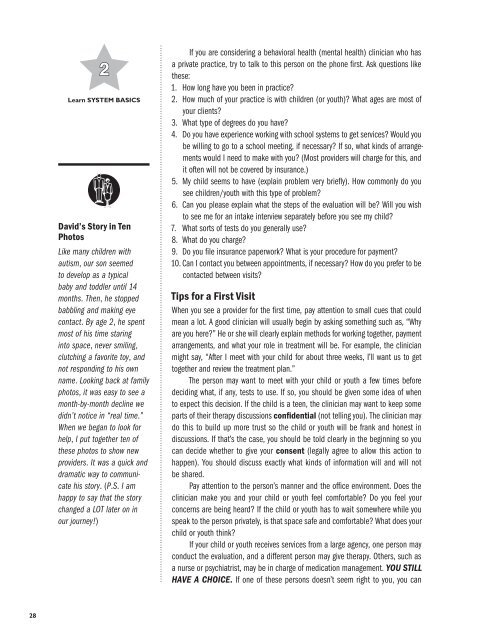Family Road Map Guide
Create successful ePaper yourself
Turn your PDF publications into a flip-book with our unique Google optimized e-Paper software.
2<br />
Learn SYSTEM BASICS<br />
David’s Story in Ten<br />
Photos<br />
Like many children with<br />
autism, our son seemed<br />
to develop as a typical<br />
baby and toddler until 14<br />
months. Then, he stopped<br />
babbling and making eye<br />
contact. By age 2, he spent<br />
most of his time staring<br />
into space, never smiling,<br />
clutching a favorite toy, and<br />
not responding to his own<br />
name. Looking back at family<br />
photos, it was easy to see a<br />
month-by-month decline we<br />
didn’t notice in “real time.”<br />
When we began to look for<br />
help, I put together ten of<br />
these photos to show new<br />
providers. It was a quick and<br />
dramatic way to communicate<br />
his story. (P.S. I am<br />
happy to say that the story<br />
changed a LOT later on in<br />
our journey!)<br />
If you are considering a behavioral health (mental health) clinician who has<br />
a private practice, try to talk to this person on the phone first. Ask questions like<br />
these:<br />
1. How long have you been in practice?<br />
2. How much of your practice is with children (or youth)? What ages are most of<br />
your clients?<br />
3. What type of degrees do you have?<br />
4. Do you have experience working with school systems to get services? Would you<br />
be willing to go to a school meeting, if necessary? If so, what kinds of arrangements<br />
would I need to make with you? (Most providers will charge for this, and<br />
it often will not be covered by insurance.)<br />
5. My child seems to have (explain problem very briefly). How commonly do you<br />
see children/youth with this type of problem?<br />
6. Can you please explain what the steps of the evaluation will be? Will you wish<br />
to see me for an intake interview separately before you see my child?<br />
7. What sorts of tests do you generally use?<br />
8. What do you charge?<br />
9. Do you file insurance paperwork? What is your procedure for payment?<br />
10. Can I contact you between appointments, if necessary? How do you prefer to be<br />
contacted between visits?<br />
Tips for a First Visit<br />
When you see a provider for the first time, pay attention to small cues that could<br />
mean a lot. A good clinician will usually begin by asking something such as, “Why<br />
are you here?” He or she will clearly explain methods for working together, payment<br />
arrangements, and what your role in treatment will be. For example, the clinician<br />
might say, “After I meet with your child for about three weeks, I’ll want us to get<br />
together and review the treatment plan.”<br />
The person may want to meet with your child or youth a few times before<br />
deciding what, if any, tests to use. If so, you should be given some idea of when<br />
to expect this decision. If the child is a teen, the clinician may want to keep some<br />
parts of their therapy discussions confidential (not telling you). The clinician may<br />
do this to build up more trust so the child or youth will be frank and honest in<br />
discussions. If that’s the case, you should be told clearly in the beginning so you<br />
can decide whether to give your consent (legally agree to allow this action to<br />
happen). You should discuss exactly what kinds of information will and will not<br />
be shared.<br />
Pay attention to the person’s manner and the office environment. Does the<br />
clinician make you and your child or youth feel comfortable? Do you feel your<br />
concerns are being heard? If the child or youth has to wait somewhere while you<br />
speak to the person privately, is that space safe and comfortable? What does your<br />
child or youth think?<br />
If your child or youth receives services from a large agency, one person may<br />
conduct the evaluation, and a different person may give therapy. Others, such as<br />
a nurse or psychiatrist, may be in charge of medication management. YOU STILL<br />
HAVE A CHOICE. If one of these persons doesn’t seem right to you, you can<br />
28














